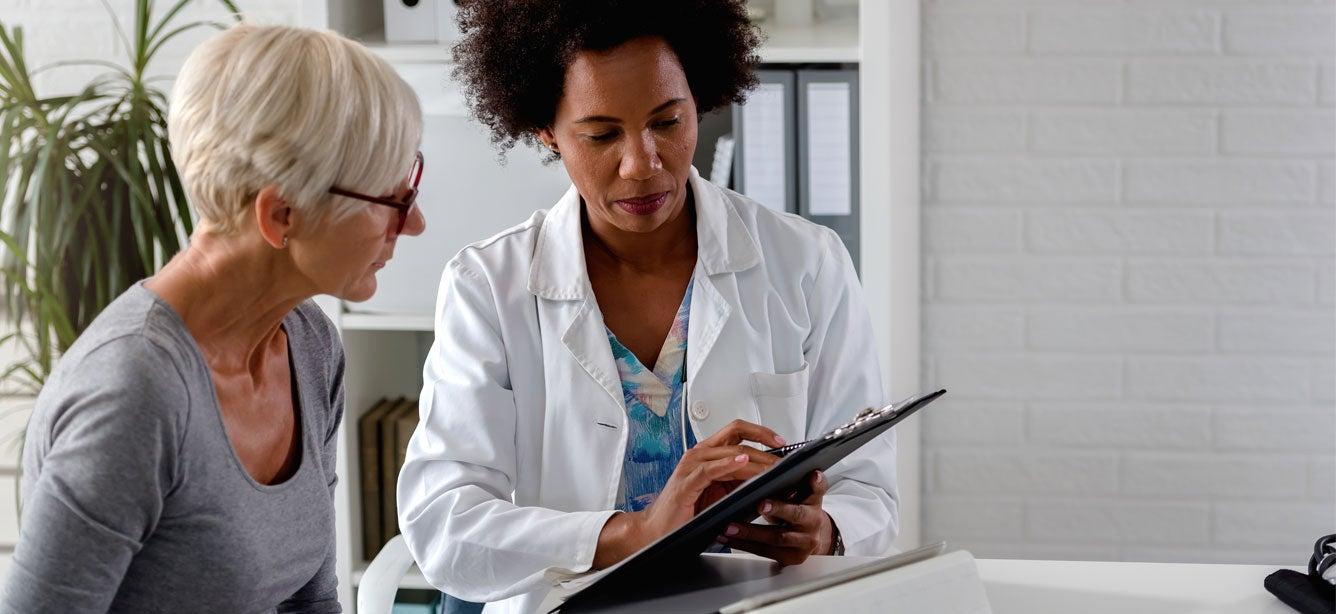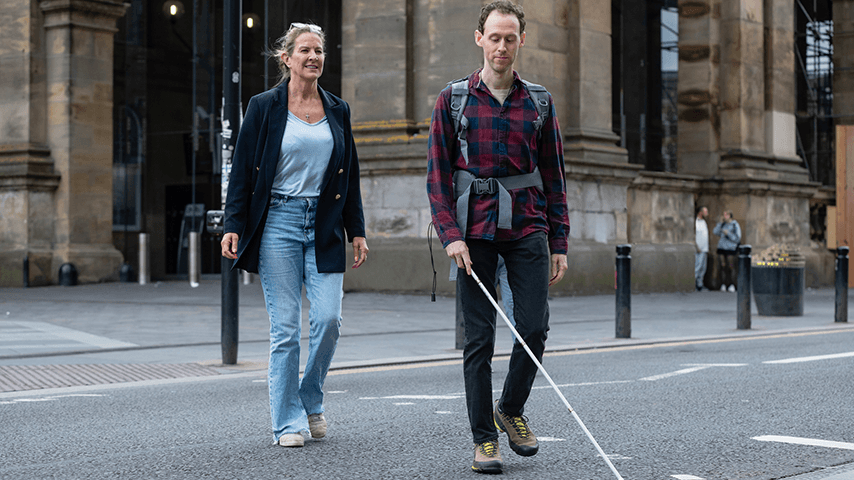
Related Topics
Vision loss can have a profound impact on someone’s life. But vision rehabilitation training, including a broad range of independent living skills, helps adults facing blindness, low vision, or significant vision impairment live more independently.
Importance of a low vision exam and vision rehabilitation assessment
A low vision exam or consultation with a vision rehabilitation agency can quickly assess the challenges an adult with vision loss faces. Training, devices, home modifications, and other skills can help adults accomplish crucial daily activities to improve their safety, confidence, and quality of life. These skills also help adults maintain vital social connections to reduce the risk of loneliness and related depression. Learn more about blindness, low vision, comprehensive eye exams, and low vision exams.
What independent living skills are important for adults with blindness and low vision?
Key independent living skills for people with blindness and low vision include:
- Orientation and mobility: Vision loss can impact your ability to orient yourself in a space and understand your surroundings. Orientation and mobility training can hone direction skills and provide new ways to interpret and navigate home and community spaces.
Training may include using a white cane, guide dog, GPS, other apps, or mobility aids. Training hones auditory and tactile cues to detect surface changes and audible cues to cross intersections safely. Training can include local public transportation and other tools to enhance orientation, mobility, and safety. - Communications: Using mobile devices, access technology, and other assistive devices and aids is crucial to remain connected with family, friends, and the world – and to advocate for yourself. Screen readers, voice assistants, smart speakers, voice recognition software (e.g., voice-to-text and text-to-voice), and other adaptive technology are important for calling, texting, emailing, and accessing essential information online.
Braille training—also offered by many vision rehabilitation agencies—can assist with reading and writing. Since technology is constantly evolving, your local vision rehabilitation agency can help you stay abreast of significant additions and changes in tools and technology. - Maintaining vital connections: Staying socially connected and participating in the activities you enjoy can significantly reduce the risk of social isolation, loneliness, and depression. In addition to training with all the access technology and devices listed above, many vision rehabilitation agencies offer support groups or can connect you with support groups to share experiences with others facing blindness and vision loss and discuss challenges and solutions for everyday activities and other topics.
- Meal preparation and food safety: Training can help with emphasizing how to safely use kitchen tools and appliances, including the microwave, toaster, stove, and oven. Tactile marking and labeling, including adhesive bump dots and braille labels, can be used on kitchen surfaces and appliances, measuring cups and spoons, and pantry items to help identify canned foods, spices, and other ingredients. Food safety training can help with grocery shopping, food storage, and meal preparation.
- Personal care and medications: Vision loss can impact the ease of bathing, dressing, and other personal care. Magnifiers and other assistive aids can help with personal grooming, shaving, or applying makeup. Training can also teach the safe use of sharp objects such as razors and scissors. Labeling or magnification devices can increase safety for adults taking one or more prescription medications. Did you know that CVS Pharmacy offers Spoken RX? This smart-tagged prescription label works with a CVS app to read prescription information aloud in English or Spanish.
- Home organization and modification: Home modifications, accommodations, and training are tailored for each person and their unique living environment. In addition to more significant home modifications, floor plans can adapt to streamline furniture placement, and color contrast can help differentiate floors, furniture, walls, and doorways. Contrast can also help adults with low vision identify light switches, outlets, surface changes, steps, stairs, and more. Lighting changes may also enhance orientation. Vision rehabilitation agencies can provide guidance and support.
- Cleaning: Tactile labeling helps identify cleaning products and mark appliances—such as clothes washers and dryers— for safer use. Accessible cleaning tools and appliances can also enhance the home cleaning process.
- Finances and money management: Training helps you maintain independence with budgeting, money identification, and a broad range of financial transactions. Assistive technology facilitates online banking, other digital financial tools, and reading important financial documents. The use of apps and assistive aids includes screen readers and magnifiers.
- Time management: Access technology and accessible software help create and maintain your calendar and effectively manage day-to-day and longer-term activities.
- Emergency plans and preparedness: It’s something we may not think about often. Still, everyone, including adults living with blindness or vision loss, should have an emergency preparedness plan and understand how best to communicate with emergency responders, family, and neighbors in the case of an emergency. Tactile labeling can also be used on emergency equipment. Mobile phone settings can be programmed to quickly contact emergency services or your emergency contacts using accessible touch.
Early support for blindness and vision loss is best
If you or someone you care for is experiencing vision loss that cannot be corrected—through prescription glasses or other medical treatment—it’s important to begin vision rehabilitation training as early as possible. This is especially true in cases where an eye disease may reduce sight over time. Taking advantage of vision rehabilitation programs earlier can make training more accessible and dramatically help ease the adjustment to low vision or blindness.
Help is just a click or phone call away. If you or someone you care for is facing life challenges due to blindness or low vision, schedule an eye exam today. To access vision rehabilitation services in your state:
- Visit the Time to Be Bold State Directory
- Email the APH Connect Center at connectcenter@aph.org
- Call the APH hotline to speak with someone who can help
You can also find practical coping strategies for everyday tasks, find a support group, and access free online resources at APH Connect Center and VisionAware.
This project was supported, in part by grant number 90CSSG0048 and 90FPSG0051 from the U.S. Administration for Community Living, Department of Health and Human Services, Washington, D.C. 20201. Grantees undertaking projects under government sponsorship are encouraged to express freely their findings and conclusions. Points of view or opinions do not, therefore, necessarily represent official Administration for Community Living policy.



